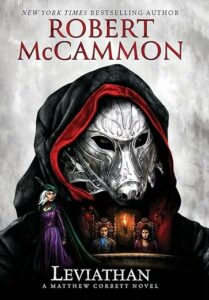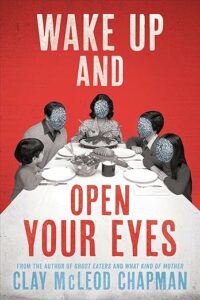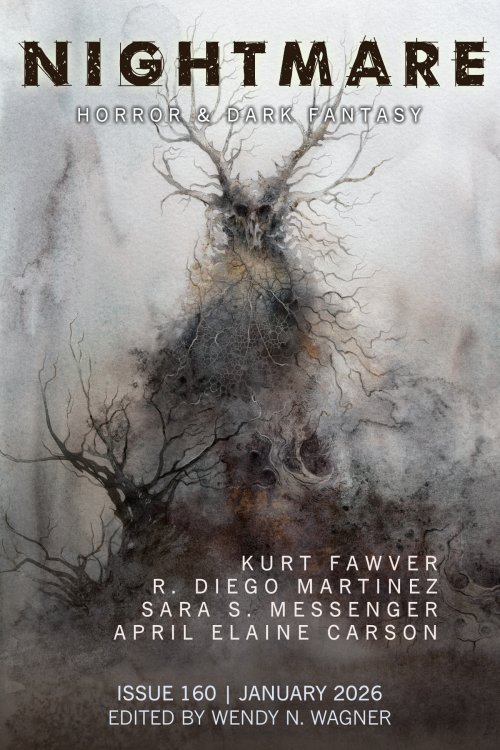Three offerings today, one long-awaited, one a novel that arrived new to me, third a theatrical production it’s likely you won’t get to see, though I hope that I can make my little contribution toward changing that.
Leviathan
Robert McCammon
Hardcover / Ebook
ISBN: 978-1941971406
December 3, 2024, Lividian, 384 pgs
 The long-awaited one is Leviathan (Lividian, December 2024), the tenth and final novel of Robert McCammon’s Matthew Corbett. It has taken exactly twenty years for McCammon to write the series, which began in 2002 with Speaks the Nightbird and has been a bumpy road since then, not always superb and sometimes, I have to say, absurd, but never less than entertaining. But who is Matthew Corbett? He is a young early eighteenth-century problem solver, precursor to James Bond and Sherlock Holmes, plying his trade on a colonial Manhattan Island where he contends with, among other things, a Moriarty figure known as Professor Fell. The novels pit him against dire villains of a gleefully pulpy sort, some of whom will not kill somebody in an easy way if a dire and elaborate method is available. By Leviathan, events have taken Corbett to Europe, where he has now spent multiple novels, being dragged deeper and deeper into the realm of baroque villainy, and in this one, he is part of a team that includes Fell, the monstrous Cardinal Black, and Corbett’s friend Hudson Greathouse, searching Venice and its environs for a mirror that is rumored to be a pathway to Hell.
The long-awaited one is Leviathan (Lividian, December 2024), the tenth and final novel of Robert McCammon’s Matthew Corbett. It has taken exactly twenty years for McCammon to write the series, which began in 2002 with Speaks the Nightbird and has been a bumpy road since then, not always superb and sometimes, I have to say, absurd, but never less than entertaining. But who is Matthew Corbett? He is a young early eighteenth-century problem solver, precursor to James Bond and Sherlock Holmes, plying his trade on a colonial Manhattan Island where he contends with, among other things, a Moriarty figure known as Professor Fell. The novels pit him against dire villains of a gleefully pulpy sort, some of whom will not kill somebody in an easy way if a dire and elaborate method is available. By Leviathan, events have taken Corbett to Europe, where he has now spent multiple novels, being dragged deeper and deeper into the realm of baroque villainy, and in this one, he is part of a team that includes Fell, the monstrous Cardinal Black, and Corbett’s friend Hudson Greathouse, searching Venice and its environs for a mirror that is rumored to be a pathway to Hell.
Leviathan is not, I must say, the best book in the series. There are point of view problems, and if you examine the text carefully, not much in it involves the problem solver being the one who solves problems; mostly, his allies, which include some unlikely ones, do. That said, the volume gives us everything desirable in the final novel of a series, including a bunch of long-awaited consummations. After Corbett returns to New York after several books and years of story time away, there is even a divine Easter Egg, involving turnover at the detective agency he works for. I report that I giggled like mad.
Wake Up and Open Your Eyes
Clay McCleod Chapman
Hardcover / Ebook
ISBN: 978-1683693956
January 7, 2025, Quirk Books, 384 pages
 The other novel is Wake Up and Open Your Eyes by Clay McLeod Chapman, which has one foot in the venerable zombie subgenre. The murderous shamblers in this book are not ambulatory corpses, but then the subgenre has always had room for living people who have been deranged by some form of infection; see, for instance, the film 28 Days Later. Here, it is a signal broadcast on mass media, and in particular on a right-wing network called, I kid you not, Fax News. This is not exactly subtle.
The other novel is Wake Up and Open Your Eyes by Clay McLeod Chapman, which has one foot in the venerable zombie subgenre. The murderous shamblers in this book are not ambulatory corpses, but then the subgenre has always had room for living people who have been deranged by some form of infection; see, for instance, the film 28 Days Later. Here, it is a signal broadcast on mass media, and in particular on a right-wing network called, I kid you not, Fax News. This is not exactly subtle.
Before approximately half of you curl your lip at this, your friendly correspondent is compelled to note that the infection has other vectors not related to politics, that some people here are driven mad by months of exposure to diet vlogs and streaming games. The common factor is those broadcast and streaming sources that suck up time and brain-space to the point of monomania.
The book is uneven. There is a section, “Phase Two: Recruits,” that focuses on one family gradually driven mad by the infection, and it is almost two hundred pages long, an exercise in making a few very basic points, over and over, only with more and more vehemence. It, like the rest of the book, is written in prose that evokes tics Stephen King has mostly walked away from, including some exclamations in italics and others in all-caps, and there is way too much of this. I am bloody serious. As someone who did some of that myself, in my earliest professional prose, but also walked away (for the most part), it is way too much.
That said, the rest of the novel is pretty damn good. The opening section is a great set piece on that zombie-fiction trope, the close-quarters battle with loved ones who, thanks to the infection, are no longer your loved ones. The last third of the book is a different take on that other trope: the desperate flight through infected territory. Chapman has a gift for characterization, and for cruelly visual action, and the book hinges on the maddening psychic cost of protracted exposure to such horrors, down to a finale which is ambiguous in all the worst (but best) ways.
• • • •
The chief pleasure and purpose of this column is sharing commendation of entertainments that I hope others will check out. It is sad to me that the stage play I now mention will likely remain outside your reach for a bit, as what I saw was a local production in Leesburg, Florida, put on by the Melon Patch Players and staged by them, I think, less than a dozen times, with no further commitment for appearance elsewhere. It is The Devil Inside: The Curious Case of Dr. H.H. Holmes by Derek Wallman and Beau Mahurin.
It is based on the life and crimes of the prolific Chicago serial killer of that name, certainly one of the more grotesque stories of American crime. What I have to tell you is that the first act presents Holmes from a perspective that implies his crimes but doesn’t drop the shoe until the break. It is ragged and, I think, can use some work. But the second act is extraordinary. It mostly takes place after Holmes is in custody and devotes some space to the heartbreak and ruined lives of people, including several women, who thought him a good man they could trust. Mostly communicated in song, it is absolutely devastating—I wept, as I tend to do—but the true showstopper, saved for the end, is Holmes breaking the fourth wall and indicting the audience itself. It is one of the great tour-de-forces I have seen.
It is my hope, forlorn as it is, that these words will reach somebody with production credentials who can start the dominos falling toward a wider audience. The ball’s in your court.
• • • •
Associational novel received but not read in time to include in this column: The Hitchcock Hotel by Stephanie Wrobel, about murders committed at a Hitchcock-themed bed and breakfast. I know naught of its quality, but merely testify to its existence.









